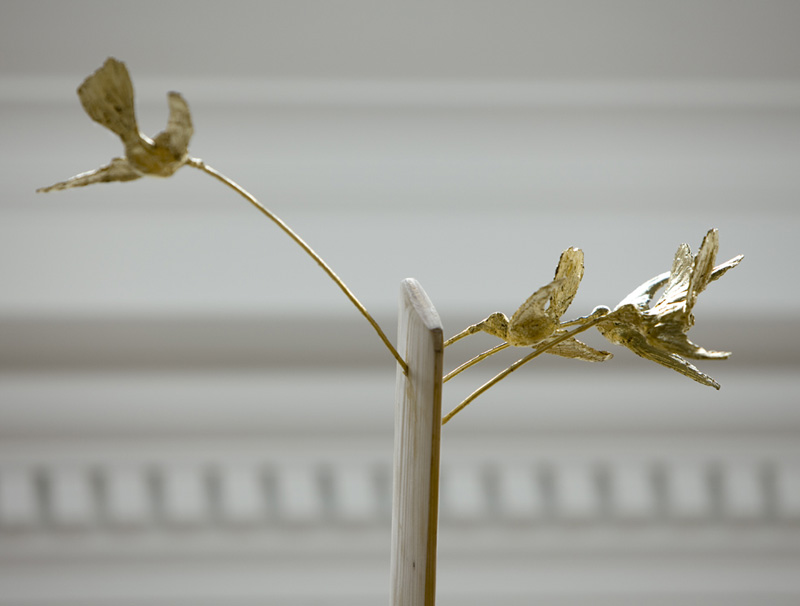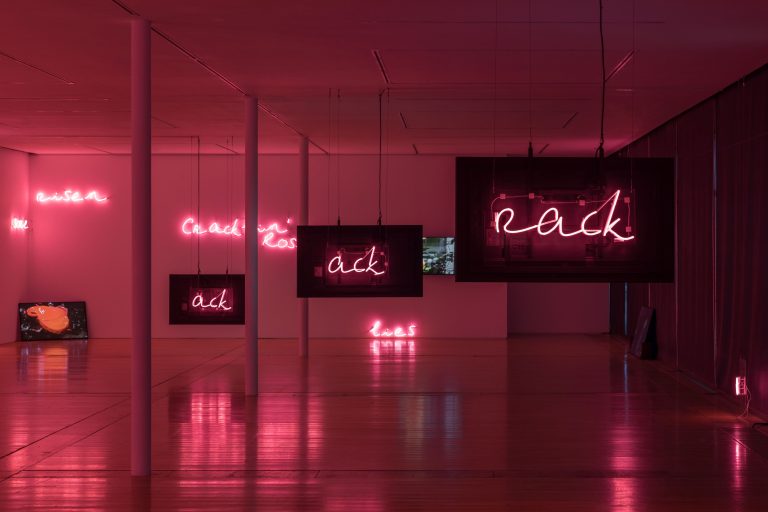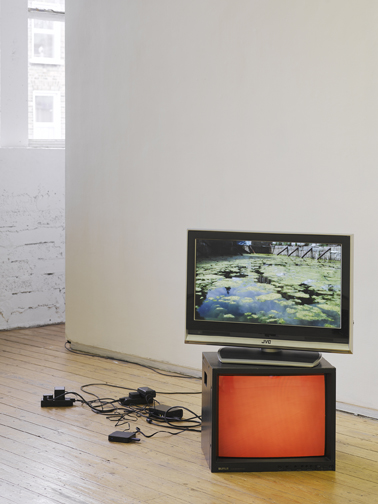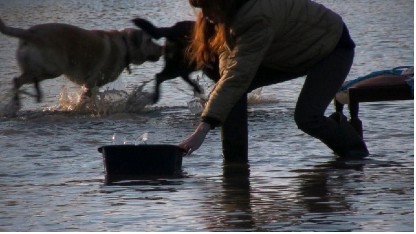Tiltshift is a new body of work produced by Niamh McCann for the Golden Bough series at the Hugh Lane Gallery in Dublin. This series, in general, is designed to showcase significant contemporary Irish artists – it having begun in early 2008 with Dorothy Cross’s Land Scape.
McCann, who is represented by the Green on Red Gallery in Dublin, has responded to the Golden Bough Room with a mixture of drawing, painting, collage and sculpture, with the intention of looking at “the collective memory and its bearing on the construction of visual historical narratives.”
On the wall, opposite the entrance of the oblong shaped Golden Bough room, are six cranked oars that protrude, side-by-side, overhead – churning the space. From a certain angle they suggest of a series of unravelling honeycomb cells. Looking closer, one can see that they are a boat’s tiller and oar fused together – the tiller denoting direction and the oar denoting linear thrust. From left to right, these hybrid, timber oars form a visual rhythm while also rotating a quarter turn. The first has some humming birds feeding from it, the last two support a slim, lurid length of neon.
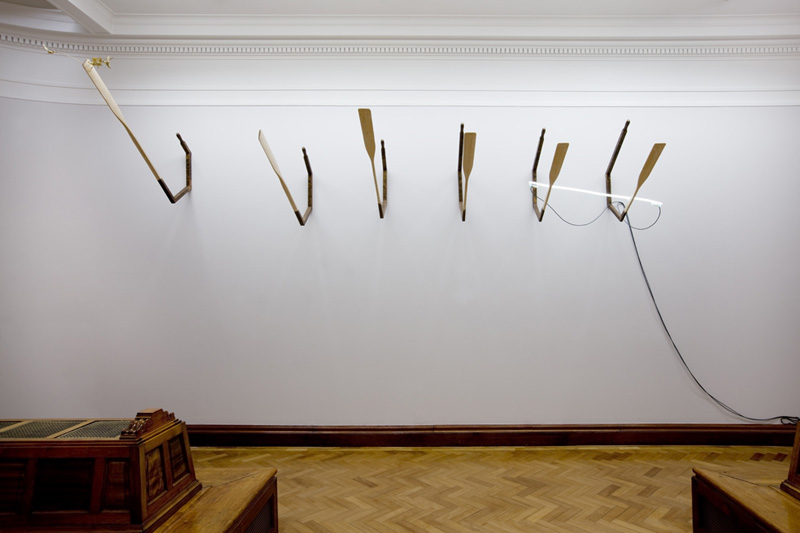
Niamh McCann: Tiltshift
Golden Bough Room at the Hugh Lane, installation view
2010
Image courtesy of The Hugh Lane Gallery.
Purlieu, McCann’s 2009 solo show in the Green on Red, illustrated the cultural no man’s land between the rural and the urban, and how this spliced seam can be transferred and applied to the systems of language and their transient nature. [1] Residues of that work re-appear here, most overtly in a Nixon/Khrushchev image where Khrushchev’s head has been replaced with a bird’s. This image is a re-working of a photo from the infamous 1959 “kitchen debate” at the American National Exhibition in Moscow.
On the curved walls at either side of the entrance are six collaged images. Common to each is a mushroom cloud painted in watercolour directly onto the wall. Around, or slightly obscuring each of the clouds, are carefully arranged orange, sky blue and wine-coloured collages, comprised of paintings, found (or sought) Russian lifestyle magazine pages and draped strands of knitting wool. These bring the momentous and the banal into a co-existence, with re-worked images of: photographs of the Moon Landing, The Manhattan project, Ed Ruscha’s Standard, a girl picking flowers, a woman looking at a duck.
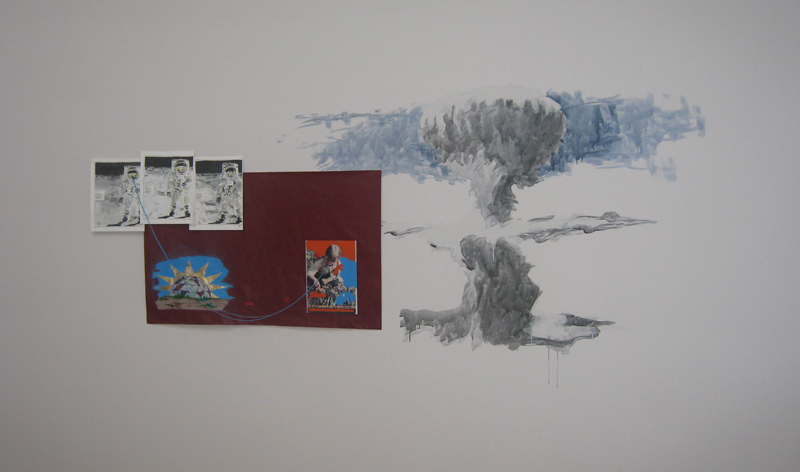
Niamh McCann: Tiltshift
Golden Bough Room at the Hugh Lane, collage, watercolour
2010
Image courtesy of The Hugh Lane Gallery.
Another trait common to each evolving assemblage is: the historic images denoting a presented American culture are momentous, whereas the images of the presented Soviet culture are pastoral and eerily banal. It questions the reliability of a historic culture (however recent) presented through photograph. By re-painting the original photographic images (of the moon landing, etc.) McCann reinforces this, perhaps overly so.
However, by showing the strangely banal alongside the now familiarly momentous, the viewer is forced to consider one’s own set of cultural co-ordinates, while also questioning the cultural conditions that have contributed to the defining of those co-ordinates.
“Historical tipping points …… are familiar moments captured and stored in our collective psyche. Different messages, different time periods, different forms of communication are merged with the idea of disrupting hierarchies and opening new space for reflection.” [2]
The work is playful but the choice of deploying cultural images from the two main superpowers of the last century does bring reference to Hegel’s Dialectic Process – with the presentation of a thesis, antithesis and from these, a new synthesis. The reference to the Soviet state also evokes Hegel’s pupil Marx, who had in turn inverted Hegel’s rationalist ideas into materialist ones and from this produced his Communist Manifesto. [3]
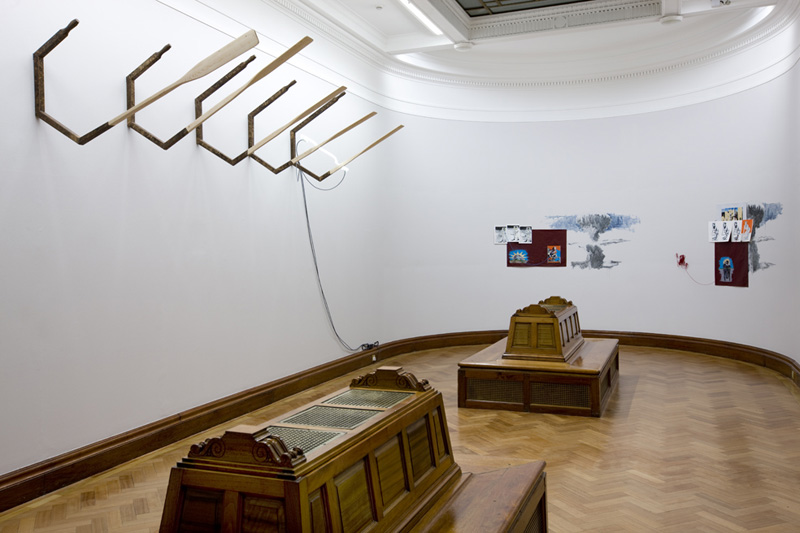
Niamh McCann: Tiltshift
Golden Bough Room at the Hugh Lane, installation view
2010
Image courtesy of The Hugh Lane Gallery.
This constant inversion, flipping and moving is lucidly created and captured in the work. To open such a broad discussion, so coherently, in what is a relatively small physical space – without it being cluttered or didactic – is at once daring and graceful.
Tiltshift was curated by Michael Dempsey.
Adrian Duncan lives and works in Dublin.
[1] Purlieu, Niamh McCann, Green on Red Press release, 2009
[2] The Golden Bough Press Release for Tiltshift.
[3] The Magee Discussions – Hegel and Marx, Bryan Magee with Peter Singer, http://www.youtube.com/watch?v=IxjnG1X510A

